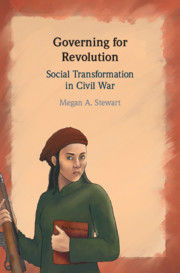Crossref Citations
This Book has been
cited by the following publications. This list is generated based on data provided by Crossref.
Stewart, Megan
and
Kitchens, Karin
2021.
Explaining Variation in Challenges to Social Conventions: Black Political Leadership and 'Contraband Camps' in the U.S. Civil War.
SSRN Electronic Journal ,
Stewart, Megan A.
and
Kitchens, Karin E.
2021.
Social Transformation and Violence: Evidence from U.S. Reconstruction.
Comparative Political Studies,
Vol. 54,
Issue. 11,
p.
1939.
Stewart, Megan
2021.
Revolution Reconsidered: An Alternative Approach to Understanding Social Revolution.
SSRN Electronic Journal,
Skjelderup, Michael Weddegjerde
2021.
Insurgent engagement with kinship group authorities: production of order and governance in Somalia’s Lower Jubba province.
Third World Thematics: A TWQ Journal,
Vol. 6,
Issue. 1-3,
p.
52.
Tank, Pinar
2021.
Rebel governance and gender in northeast Syria: transformative ideology as a challenge to negotiating power.
Third World Thematics: A TWQ Journal,
Vol. 6,
Issue. 1-3,
p.
69.
Lee, Melissa
2021.
International Statebuilding and the Domestic Politics of State Development.
SSRN Electronic Journal,
Lee, Melissa M.
2022.
International Statebuilding and the Domestic Politics of State Development.
Annual Review of Political Science,
Vol. 25,
Issue. 1,
p.
261.
MENG, ANNE
and
PAINE, JACK
2022.
Power Sharing and Authoritarian Stability: How Rebel Regimes Solve the Guardianship Dilemma.
American Political Science Review,
Vol. 116,
Issue. 4,
p.
1208.
Loyle, Cyanne E
Braithwaite, Jessica Maves
Cunningham, Kathleen Gallagher
Huang, Reyko
Huddleston, R Joseph
Jung, Danielle F
and
Rubin, Michael A
2022.
Revolt and Rule: Learning about Governance from Rebel Groups.
International Studies Review,
Vol. 24,
Issue. 4,
Shesterinina, Anastasia
2022.
Civil war as a social process: actors and dynamics from pre- to post-war.
European Journal of International Relations,
Vol. 28,
Issue. 3,
p.
538.
Cancian, Matthew
and
Greenwald, Diana B.
2022.
Infrastructure, Revenue, and Services: Non-State Governance in Iraq’s Disputed Territories.
Civil Wars,
Vol. 24,
Issue. 4,
p.
445.
Jüde, Johannes
2022.
Making or un-making states: when does war have formative effects?.
European Journal of International Relations,
Vol. 28,
Issue. 1,
p.
209.
Teiner, David
2022.
Rebel governance: a vibrant field of research.
Zeitschrift für Politikwissenschaft,
Vol. 32,
Issue. 3,
p.
747.
Balcells, Laia
and
Kalyvas, Stathis
2022.
Revolution in Civil War: The 'Marxist Paradox'.
SSRN Electronic Journal ,
Florea, Adrian
and
Malejacq, Romain
2023.
The Supply and Demand of Rebel Governance.
International Studies Review,
Vol. 26,
Issue. 1,
Stewart, Megan A.
2023.
One Perspective on the Evolution of Civil Wars Research.
Civil Wars,
Vol. 25,
Issue. 2-3,
p.
208.
Sharif, Sally
and
Joshi, Madhav
2023.
Territorial consolidation after rebel victory: when does civil war recur?.
Territory, Politics, Governance,
p.
1.
Loyle, Cyanne E.
2023.
Rebel courts and rebel legitimacy.
International Politics,
Giri, Keshab
2023.
Rebel Governance of Marriage and Sexuality: An Intersectional Approach.
International Studies Quarterly,
Vol. 67,
Issue. 2,
Corradi, Edoardo
2023.
Joining the fight: the Italian foreign fighters contingent of the Kurdish People's Protection Units.
Italian Political Science Review/Rivista Italiana di Scienza Politica,
Vol. 53,
Issue. 2,
p.
201.



